Is It Better to Exercise or Diet for Weight Loss?

We are told that combining diet and exercise is critical to our long-term weight loss and health, and it’s backed by empirical evidence, not to mention that it makes sense. While this is true, it is not the end of the story. We must explore the nuances of diet and exercise for weight loss to understand how to move forward fully. For one, which is better? Dieting or exercising? Let’s take each of these one at a time and know how they are best used to improve your overall health.
What to Do If You Don’t Feel Hungry After Bariatric Surgery

Not feeling hungry after bariatric surgery is a very real possibility. And I know. I’ve lived it. And almost four months out from surgery, I am still feeling it. It’s a double-edged sword – you got weight loss surgery to help suppress appetite and eat less. But, now you might not like eating food, and that’s a challenge too.
Everyone’s different. And as we know it’s impossible to compare the experiences of two bariatric patients. So, if you are not having trouble eating after surgery, then kudos! High-five! That’s fantastic for you, and hopefully, you’re now only eating limited amounts of food.
How I Almost Got in My Own Way and Didn’t Have Bariatric Surgery
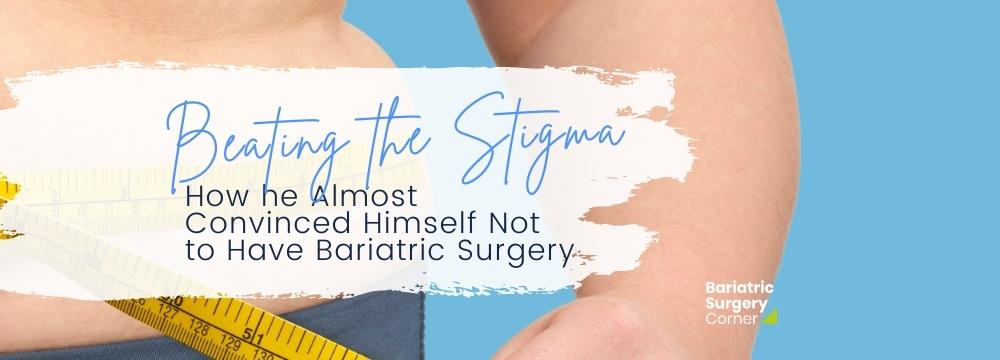
My story is a long one. And I don’t mean long as in a story littered with detail. The plot is simple. But it has played out over 11 years. It’s like one of those three-and-a-half-hour movies that seemingly won’t end but could have been wrapped up in just two. Mine is a story that reeks of senselessness, stubbornness, weakness, despair – you get the point. It’s a classic story of someone on top, who then drops, and then continues quite a bit lower. And I did it to myself – classic self-sabotage.
I’m not sure – I can’t assume the circumstances of anyone else’s journey – but maybe this is a familiar story amongst those of us who needed a life-altering change like bariatric surgery.
Getting Proper Sleep to Maximize Your Weight Loss After Bariatric Surgery

It’s easy to think that the weight loss process after bariatric surgery is as simple as “calories in and out,” but that’s not always the case. To be sure, the number of calories you consume is directly related to the amount of weight loss you can achieve. If you are not in a calorie deficit, it stands to reason that you won’t lose weight. Of course, exercise also plays a vital role in increasing muscle mass to aid in reaching a calorie deficit. But you may have found, through previous highly restrictive diets, that you gain the weight back quickly once you “stop.” No matter how restrictive your diet is, you can hit a wall, making it even more tempting to cut calories to see the number on the scale go down again.
The body is a finely tuned machine; it is not simply about kale and cardio to reach long-term and sustainable weight loss. Several other factors, including how your body processes those calories and whether it’s doable over the long term, determine whether your “diet” is sustainable and effective.
Trialing Post-Op Nutrition Before Surgery
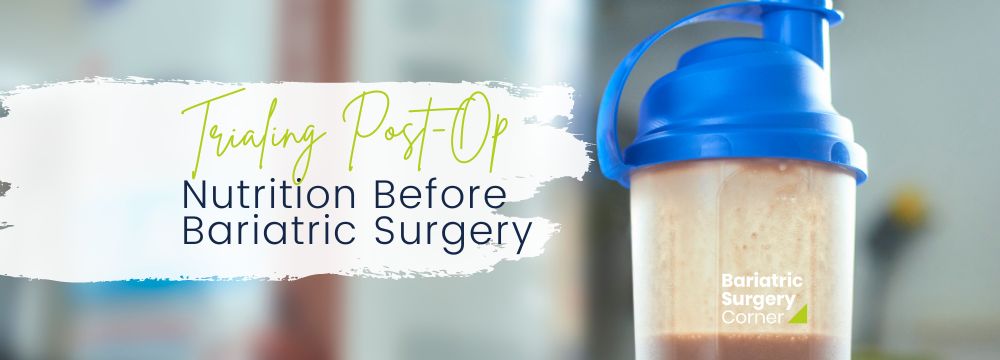
During the pre-operative process (especially during the 2-week liver shrink diet), it can be of great benefit to accumulate and ‘experiment’ with various nutrition formulations such as clear and full liquid protein and supplement sources. Researching and anticipating the expense of these nutrition sources is also an important step in planning life after bariatric surgery. You can start by acquiring a variety of flavors and compositions of nutrition aids that might be most beneficial before you become limited by the physical discomforts of post-op recovery. Further, it reduces your reliance on friends’ or family’s availability to attend to such needs during that initial post-op period.
During these times, taste and ingredient intolerances may become apparent. These are usually found with the consumption of concentrated dairy (whey protein) shakes and artificial sweeteners that may create tremendous laxative effects or gaseous issues. Knowing this before surgery can save time and experimentation later on.
Why Patients Are Encouraged to Lose Weight Before Bariatric Surgery
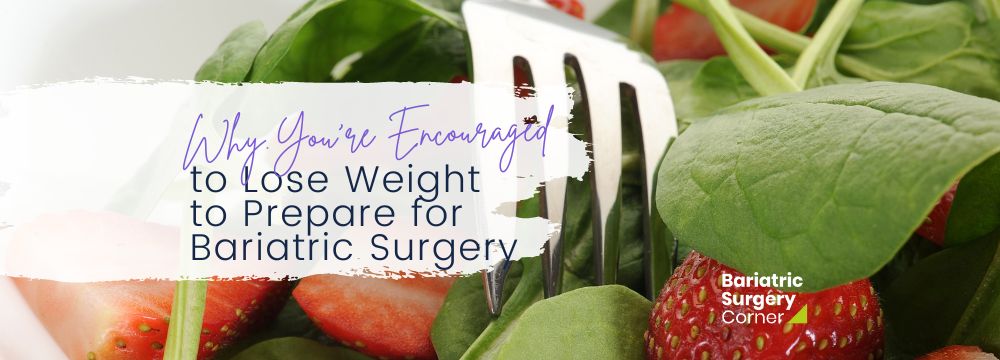
Intentional dietary weight loss leading up to bariatric surgery may seem counterintuitive to some. Even the most thoughtful of us in this life-altering journey may still view a decision toward surgery as a sort of ‘license to binge’ or attempt ‘one last hurrah’ before changing our eating habits forever. The question is often posed: “Well if I could diet and lose weight, why would I need surgery.” Simply put, surgery maintains and propels weight loss for an overwhelmingly longer time than diet and exercise efforts alone. Most patients have been on a broken chain of diets nearly their entire lives. And weight regain is almost inevitable within a year or less for most attempting lifestyle modifications without the backstop of surgery.
All-in and All Aboard in Preparation for Weight Loss Surgery
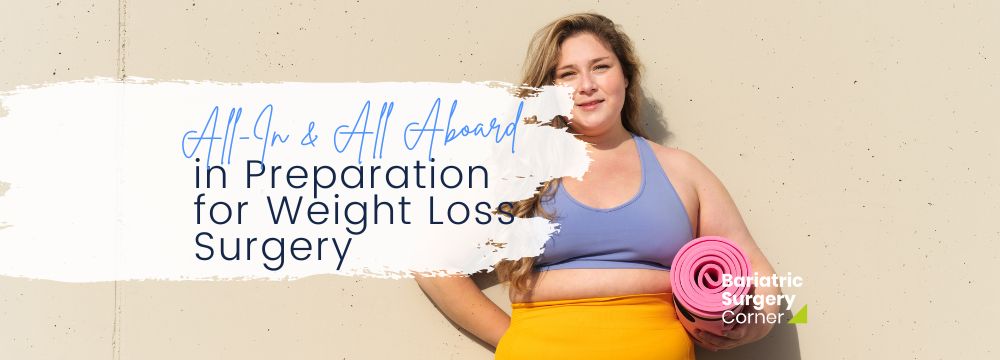
The most important and general predictor of success leading up to any bariatric surgical procedure is engagement and commitment to the preoperative program. Most bariatric surgical programs involve multiple steps to assess suitability for surgery and diagnose potential pre-operative issues. Among these general processes are engagement in weight loss surgery support groups, accessing nutrition materials and resources, and intentional weight loss regimens leading up to the day of surgery.
Surgical weight loss support group meetings may not benefit everyone in the same way. These forums may be excellent for those who open their minds to these sharing opportunities. Other patients may dismissively refer to them as ‘group gropes’ where stories and feelings may be excessively displayed. However, the benefit of these visits exists irrespective of the quality of speakers, words spoken, or production value of visual aids. The advantage is the individual patient’s dedicated investment of time, thought, and effort in their weight loss process. Committing that time to any activity, whether the content is seemingly productive or not, tends to reinforce the commitment to one’s imminent change.
Alana Thompson, AKA ‘Honey Boo Boo’ Is Considering Weight Loss Surgery
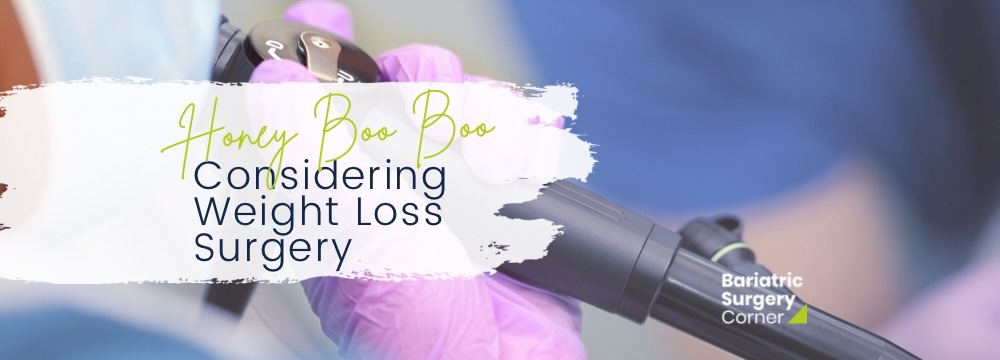
You may have read the recent news about Alana Thompson, famous as ‘Honey Boo Boo,’ in the hit TV show Here Comes Honey Boo Boo, thinking about weight loss surgery. While she would not be the first celebrity to take the surgical route, a few thoughts surrounding her next step in improving her weight and overall health are interesting and should be discussed.
Before we do that, it is important to congratulate her on considering a very important step toward taking control of her life and health. It’s never easy to decide to undergo significant weight loss, so she should be commended for exploring this opportunity and all it entails. There is also a larger conversation to be had about Miss Thompson’s age, and this is certainly to be discussed in another blog. But for now, the current conversation touches on some important factors, including what this “newer” procedure is, and the expectations/myths of weight loss surgery in general.
Is All Protein the Same?

We all know how important protein is. But while we speak generically about the term protein, is all protein the same, or are there any differences we should keep in mind?
First, let’s start by differentiating between protein and food sources of protein.
Make The Most of Your Outdoor Plans This Spring & Summer

As we hit full Spring swing, so comes the opportunity to spend time outdoors. It’s usually a time to eat, too. For many bariatric surgery patients, however, the temptation to eat certain foods – and the struggle to resist them brings feelings of loss, emptiness, and guilt.
Here are some tips to eat well and manage the temptations around you:
Fighting Hunger After Weight Loss Surgery

Some post-bariatric surgery patients constantly feel like they are fighting hunger. It can be very frustrating for the patient who has chosen to embark on this journey to accept that surgery was not a magic bullet. However, patients are reminded pre-surgery that the procedure they’ve chosen is only one component – albeit a key one – that must be utilized in concert with diet, exercise, and support group attendance. These together will yield the most significant long-term result. We get that, you might say. But now we’ve had surgery; in the case for example of restrictive bariatric surgery our stomachs are smaller, and in some cases our previous appetite is…still there!
Robotic Surgery Versus Traditional Laparoscopy
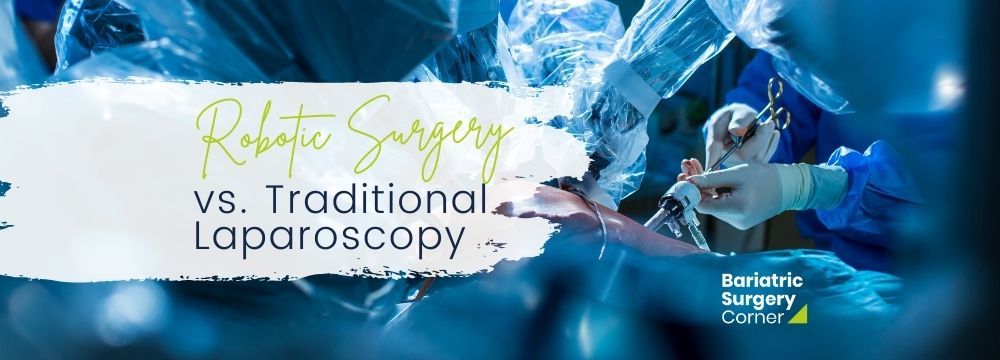
In the late 80s and early 90s, a revolution in surgical technique blossomed. The advent of laparoscopic or keyhole surgery allowed surgeons to perform complex bariatric procedures using tiny incisions rather than a single large incision. This made recovery more comfortable for patients, but it also reduced many of the risks associated with an open procedure, including infection, significant bleeding, pain, and the possibility of an incisional hernia. Laparoscopy in its traditional form has been the dominant modality for performing surgery for decades. However, another massive leap in surgical technology came to market more recently. This was known as the surgical robot. Unlike how it sounds, the robot does not perform surgery autonomously. Instead, the bariatric surgeon controls every part of the procedure from a console inside the operating room, near the patient. The robot takes the surgeon’s inputs, scales them, and translates them to the robotic arms inside the patient.
Managing Relationship Changes Due to Bariatric Surgery

Many patients are under the incorrect impression that bariatric surgery is simply a catalyst for a physical transformation. To be sure, your body will change dramatically after surgery. Not only will you lose weight, but you will experience an improvement or resolution of many of the diseases associated with morbid obesity… if you follow your postoperative plan. However, what’s often overlooked is the psychological component of weight loss. Think of the newfound psychological, emotional, and physical freedom that patients experience as they lose weight or can perform activities they may not have in years. What about the confidence to reignite their social lives and relationships?
Nutritional Deficiencies After Bariatric Surgery
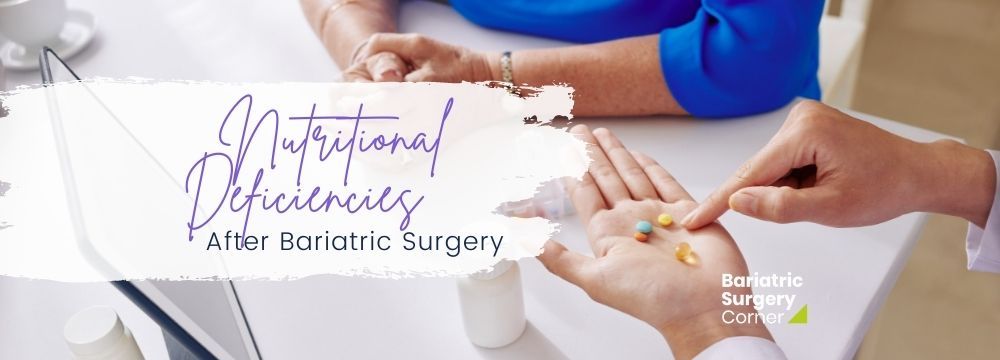
Vitamin deficiencies are a possible side effect of bariatric surgery, and as such, every patient will be started on a daily multi-vitamin. The degree to which a patient may experience nutritional deficiencies largely depends on several factors. First is the person themself – many people have difficulty absorbing one vitamin or another. Some have chronic Vitamin B12 deficiencies, while others will have trouble retaining Vitamin D. Over time, with proper testing, your surgeon will understand the root of these deficiencies and address them appropriately. The second is the procedure performed. The malabsorptive components (where part of the small intestine is bypassed) of a gastric bypass or duodenal switch lend themselves to a greater chance for nutritional deficiencies than purely restrictive procedures such as the gastric band or gastric sleeve. Finally, your lifestyle will play a key role. Remember, after surgery, you will likely not get all your vitamins and minerals from food alone – even from those foods that are nutrient-dense. Common nutritional deficiencies are:
Choosing the Right Recipes After Bariatric Surgery

There’s no shortage of recipes or cookbooks out there, and as a bariatric surgery patient looking to expand your culinary horizons, you may be tempted to try quite a few of them. Many recipes tout their unique “tastes great and healthy for you!” qualities, while others guarantee weight loss using exotic “proven” techniques. We must dig a little deeper to understand exactly what we’re eating, how we’re eating it, and how it will ultimately affect our bodies.
